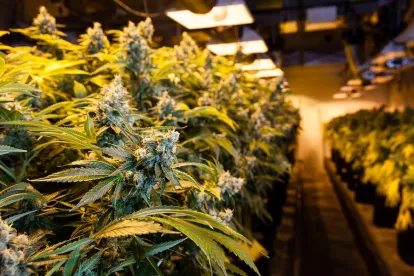One year after Wilson Elser published an article comprehensively exploring “California’s Bill to Add Marijuana Trademark and Service Mark Classifications” and other cannabis brand-protection alternatives, the referenced bill (AB 64) currently remains stalled in the legislative process, with no reported activity occurring on it since September 1, 2017 − four months before California started issuing adult-use cannabis licenses on January 1, 2018.
California’s Secretary of State recently clarified that as of January 12, 2018, trademark applications for cannabis products and services would be processed, provided the marks are lawfully used in commerce under existing California law. This welcome announcement followed a period of apparent uncertainty at the Secretary of State’s office.
Background
On December 11, 2017, the Secretary of State issued a press release announcing its website for cannabis-related business, Cannabizfile. The website contains a Frequently Asked Questions section that explains:
Beginning January 1, 2018, customers may register their cannabis-related trademark or service mark with the California Secretary of State’s office so long as: (1) the mark is lawfully in use in commerce within California; and (2) matches the classification of goods and services adopted by the United States Patent and Trademark Office. If the application submitted to register a trademark or service mark is found deficient, the application will be returned to the registrant for correction. Note: Not all cannabis-related products can be registered under current law due to the inability to meet federal classifications. (Emphasis added.)
The note of caution is an apparent attempt to reconcile allowing registration of cannabis-related trademarks with two existing California statutory provisions:
- Business and Professions Code §14272, which states that the intent of California’s state trademark law is “to provide a system of state trademark registration and protection substantially consistent with the federal system of trademark registration and protection.”
- Business and Professions Code §14235, which states, “The classification of goods and services shall conform to the classifications adopted by the United States Patent and Trademark Office.”
The United States Patent and Trademark Office (USPTO) is notoriously unfriendly to cannabis-related trademarks, because marijuana and related paraphernalia are illegal under the federal Controlled Substances Act. There is accordingly little precedent for acceptable descriptions under federal trademark classes for cannabis-related goods and services.
As amended, AB 64 was meant to address the problem caused by the above-referenced statutes by adding a new statute, Business and Professions Code §14235.5, which reads in its entirety:
(a) Notwithstanding Section 14235, for purposes of marks for which a certificate of registration is issued on or after January 1, 2018, the following classifications may be used for marks related to cannabis, including medicinal cannabis, goods and services that are lawfully in commerce under state law in the State of California: (1) 500 for goods that are cannabis or cannabis products, including medicinal cannabis or medicinal cannabis products. (2) 501 for services related to cannabis or cannabis products, including medicinal cannabis or medicinal cannabis products.
Uncertainty and Resolution
When asked in December 2017 to explain further what cannabis-related products may not be registrable, a Secretary of State Trademark Office Examiner reportedly stated that cannabis goods would not be granted trademark protection in California because no federal classes allow for the classification of cannabis. Similarly, the Secretary of State’s office reportedly informed cannabis industry attorneys late last year that the office would only process applications for cannabis-related service marks (but not trademarks for goods) on January 2, 2018, which was the first day the office was open following legalization.
The Secretary of State’s temporary confusion on this issue was puzzling because even without the new trademark classes proposed by AB 64, it is difficult to imagine any product or service that would not be covered by the existing 34 classes of goods and 11 classes of services encompassed by the Nice Classification System used by the USPTO. Other than cannabis-related goods that do not easily fall into other classes (e.g., Class 30 for cannabis-infused chocolates and candy), the USPTO website lists the following descriptions that arguably cover cannabis and cannabis products, including medicinal cannabis:
- Class 5 for “dietary supplements” and “food and substances adapted for medical use,” including “cigarettes without tobacco, for medical purposes”
- Class 31 for “natural plants and flowers” and “agricultural [and] horticultural products not included in other classes”
- Class 34 for “tobacco substitutes (not for medical purposes)” and “smokers' articles.”
In other states where recreational cannabis is legal, state trademarks for cannabis strains and cannabis-related products have been obtained under these categories. See, e.g., Colo. ID # 20161093519 (Gorilla Glue logo for a medical cannabis strain in Class 31); Oregon Reg. No. 43635 (juju joints for “smokeless marijuana or cannabis vaporizer apparatus” in Class 34); Wash. file # 56638 (“The Joint” for marijuana / cannabis in Class 31).
Thankfully, the period of uncertainty in California for cannabis trademark holders apparently ended on January 12, 2018, when Secretary of State officials informed cannabis industry attorneys that the application process was being expanded to include cannabis products as well as services under existing classes. With cannabis-related trademarks now being registered under existing classes, the organizational clarity promised by AB 64’s two new proposed trademark classes has now been undermined, further calling into doubt the fate of this portion of the still-pending bill.
Yet, regardless of other technicalities for cannabis-related trademark applications, the unambiguous requirement that any such marks be lawfully used in California commerce in order to be registrable is not expected to change. This strongly counsels in favor of trademark holders ensuring that their marks be used pursuant to a valid cannabis industry license, and that related products comply with all applicable regulations prior to filing an application for registration to avoid future potential problems that include possible invalidity.
Lastly, based on the expected influx of cannabis-related trademarks, the Secretary of State has finally launched an online filing option for trademark registrations.


 />i
/>i

